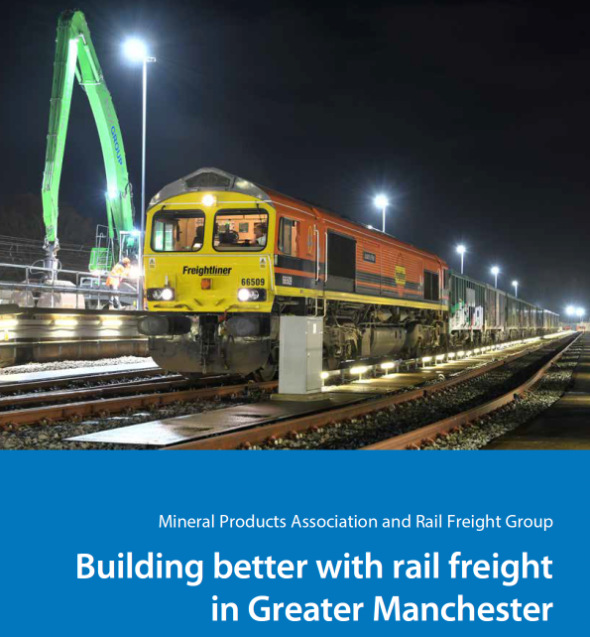A new report setting out the economic and environmental case for more rail freight into Greater Manchester has been published by the Mineral Products Association (MPA) and the Rail Freight Group (RFG).
Published this week, ‘Building Better with Rail Freight in Greater Manchester’ highlights the benefits of rail freight over road haulage for transporting essential construction materials like aggregates and cement. Rail freight typically produces 76% less carbon dioxide than the equivalent road journeys and a single aggregates train can carry the same load as up to 125 lorries.
MPA members supply around 200 million tonnes of aggregates and nine million tonnes of cement each year to meet UK demand. Working with the freight operating companies that form the RFG’s membership, around 10% of these materials are transported by rail, with the vast majority going by road.
Whilst that places mineral products as the second largest market segment on the rail network after containerised intermodal freight, MPA and RFG believe there’s a huge opportunity to grow the use of rail for construction materials, reducing lorry miles, alleviating traffic congestion and reducing carbon emissions.
The new report sets out the steps the mineral products and rail freight industries are taking to deliver that growth, and explains how local and national government, as well as Network Rail, can help support the industries’ ambitions.
Among the issues highlighted in the report are protecting parcels of land for use as urban rail terminals in the planning system, ensuring affordable and competitive track access charges, prioritising the timetabled slots for freight, and supporting electrification and other steps that support decarbonisation.
Showcasing key investments made by MPA members in Greater Manchester, the report underscores the role played by rail freight bringing in essential materials into the city to support infrastructure improvements, community regeneration and the building of new homes. All build development and economic growth require aggregates and cement, along with downstream products like concrete and asphalt.
Maggie Simpson, Director General of the Rail Freight Group, said: “Greater Manchester has one of the fastest growing economies in the UK, and is seeing investment in new homes, offices and infrastructure. Rail freight is already helping to minimise the carbon emissions of this construction, and with the right policy environment in place our members will be able to transport more products by rail into the region, reducing the number of lorries on our roads.”
Robert McIlveen, Director of Public Affairs at MPA, said: “Rail freight is an environmentally efficient way for MPA members to deliver aggregates and cement to city centre locations where they are in the greatest demand. We would love to see the market for materials by rail grow to allow the industry to supply more materials in a more efficient and environmentally friendly manner and we hope that government policy will help to deliver more desired outcomes for all.”
